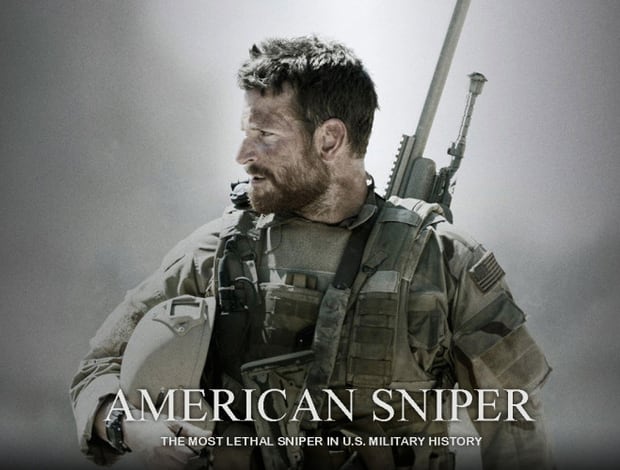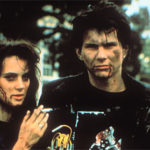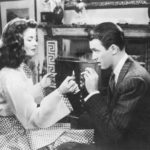
I like to pat myself on the back, because I was really of the belief that Clint Eastwood was a great artist way before everyone else realized it. It didn’t appear to be common knowledge until after Unforgiven, his amazing meditation on violence and the toil it takes on a manly killer that won Eastwood a Best Director Oscar. Eastwood’s entire career has been obsessed with notions of violence, justice, heroism and manhood. In so doing he has been an astute commentator on our love of violent movie justice, which historically Americans just can’t get enough of.
Eastwood started out in the Western genre and then moved on to crime thriller, and in both there is this need not to want teamwork. Americans for some reason like nothing more than sharing the supposed cowboy ethic of Die Hard’s John McClain, one man taking down an opposing army all by himself. A decade’s worth of soldiers died in Vietnam, but seemingly Americans are so egotistical they love nothing more than to see that John Rambo could have won that war all by himself. The absurdly entertaining Rambo II made the country feel way better about the disastrous Vietnam War.
I just saw a writer for Rolling Stone magazine accuse Eastwood of routinely assigning his characters white or black hats, but that’s not Eastwood at all. Eastwood’s “Spaghetti Westerns” embraced a stone cold killer whose heroism was so questionable that he might not have been a hero at all, which was a far cry from McClain’s true blue Roy Rogers. No one created the anti-hero as early or as effectively as Clint Eastwood.
His Dirty Harry was called Fascist by critic Pauline Kael, and for the most part there wasn’t ever that much of a response from Eastwood. Eastwood has for the most part always been fascinated by the gray area between good and evil. Amazingly, at the age of 76 he made two simultaneous movies about the Battle of Iwo Jima, one from the perspective of each side.
Before seeing the American Sniper, I was pretty quickly disgusted by its subject, Navy Seal record holding sniper, Chris Kyle. A ton of information has come out about Kyle’s callous racism and his penchant for lying about events in his post military career. Kyle was killed about a year ago when he and a friend were shot by a veteran suffering from Post Traumatic Stress Disorder that the two felt would somehow be helped by accompanying him to a gun range.
I personally have a hatred of the way Hollywood gets true life stories wrong and for the most part purposefully wrong. Unlike a lot of people, after I see a movie based on a true story I’m always dying to find out what was and wasn’t true about what I’d just seen and whether I’m being manipulated or not. Most of the time, it’s disappointing and often kind of repulsive the way events were deleted or changed by someone trying to whitewash a story and create a feel good moment about something we don’t deserve to feel good about.
Frankly, I was shocked when I read that the movie grossed an amazing 90 million dollars in its first weekend. It depressed me a bit. Most Americans are not only willing but dying to feel good about the wars in Iraq. I’m actually a little shocked that Sylvester Stallone hadn’t already given that war to John Rambo to win yet. I’m not particularly proud of America’s involvement in Iraq anyway, but I decided that I needed to see the movie, and had some faith that Eastwood wouldn’t make a blindly jingoistic film just because its subject is a blindly jingoistic soldier. This has caused a lot of reviewers to criticize the war not the movie and I decided going in to try not to do that.
Having seen the movie, it’s my belief that people tend to see what they want to see, but to me the movie is a character study that meditates on the subject of a certain type of manhood. One that is worshipped in certain crowds and one that is scary to others including myself.
When I visited the Tomb of the Unknown Soldier at Arlington National Cemetery, a soldier there told the crowd about Audie Murphy the most decorated American soldier in World War II and later an action movie star who played himself and other heroic figures on the silver screen. According to this soldier, Murphy was a psychotic who was always up front looking for action. The others soldiers might have respected him, but no one wanted him behind them for fear that he’d accidentally shoot one of his own.
In Eastwood’s movie that is who Chris Kyle is. Scenes show Kyle’s father instructing his two sons that there are three types of people – sheep, wolves and sheepdogs and he isn’t interested in raising anything but sheepdogs. Later when it turns out that Kyle’s brother turned out to be a sheep who questions what he is doing in Iraq; Kyle seems to feel sorry for him, but only to the extent that he wasn’t strong enough to make the grade.
While there is some implication that Kyle went to war because of his strong belief in America, there are many more incidents shown by Eastwood that indicate that Kyle just has a thing about wanting to prove himself to be the best of the best. Unsatisfied by being a champion rodeo rider, he wants to prove his manhood like Achilles did on the battlefield where true ‘legends” are born, and that is the nickname the other soldiers give to Kyle and his exploits.
It’s not that Kyle is better, braver, and stronger than the other soldiers, it’s that he has zero doubt about his own actions and the actions of his country. In a scene where one of Kyle’s comrades is being buried he hears the mother of the dead soldier reading a letter from her dead son written soon before his death. In the letter, the soldier meditates somberly on the notion of glory and war. According to Kyle, that soldier died the second he wrote that letter. Plenty of soldiers in this movie are tortured with doubt about the war; Kyle however doesn’t flinch once until the climax of the movie.
While Kyle is shown to gradually be suffering from the horrors of his time at war, he just becomes more and more convinced in not only the rightness of his cause, but that he personally has to save his fellow soldiers and win the war. Eastwood shows him not as a guy who knows that he is a symbol to other thankful soldiers, but actually as a guy who truly believes that he has to be in as much action as humanly possible in order to save his guys.
The action sequences are either filmed with no music or by a score made up entirely of drums. They aren’t really exciting they are just kind of sickening, tense, and sad. Modern warfare is hunting down bad guys house by house never knowing when you will be taken out by another sniper or a left behind IED. This is a war where children and women are willing to sacrifice their own lives to take you or your brothers out. Kyle never questions why this is other than to regard his adversaries to be savages.
The enemy is mostly seen as gruesome and sadistic. One high level adversary of Kyle’s likes to torture people with a drill, something that sickens Kyle, but just continues to prove to him the rightness of his cause.
The climax of the movie is Kyle finally killing off a doppelganger sniper from the other side with a near impossible mile long shot which is filmed in bullet time. However, what should have been his greatest triumph becomes his biggest error, as his hubris to win the sniper-off gives away his unit’s position before they are ready to take on the enemy. For once he wasn’t saving his guys, he was imperiling them. It’s at this point that Eastwood shows Kyle cracking as he calls his wife mid-battle to tell her that he’s ready to come home.
Post war Kyle remains dead set in his belief that he is a hero. In fact, he’s going to raise his son in the exact same way that his father raised him. He has some mental battle scars and for a while is seen to funnel those into a good place by helping fellow veterans with PTSD, a term George Carlin once said in a famous routine about war veterans to be a watered down version of the more effective term used for the syndrome in the First World War, “shell shock.”
The movie ends with Kyle walking out the door to be killed by the soldier that he was looking to help. Eastwood isn’t subtle about it the guy looks just like Travis Bickle from Taxi Driver. Oddly, this comes after a gleeful family scene where Kyle pulls a gun on his wife to the delight of his children, and it isn’t lost on me that he casually and irresponsibly leaves the gun up on a shelf before walking off to his final fate.
Bradley Cooper bulks up impressively to play Kyle. He looks like he’s been turned into the Hulk for this role. There are scenes where he electrifyingly illustrates the stress of someone who might have to shoot a child on any given day. Once in the film he does shoot, later in the film he is seconds from shooting another until to his great relief the child thinks better about using a rocket launcher he found in the street. Other scenes by Cooper are a little cartoonish. He’ll hear about someone’s death or disfigurement and puff up with determination as if it is his personal responsibility to avenge every single one of these incidents.
The last three minutes or so of the movie however is a dead set sad rendering of “Taps” accompanying images of Kyle’s funeral and other tributes to him. To me it feels like the only time in the movie where Kyle is outright painted heroic, and as such leaves me wondering about whether it ruins the steady unflinching eye of the rest of the movie.
Most character studies make it a point to show the growth or the change in the character that they are portraying, from this movie and what I’ve read about Kyle’s actions back home after his service – which including ego boosting hubris about events that never happened (punching Jesse Ventura, killing two carjackers, shooting at looters during the aftermath of Hurricane Katrina) – Kyle never wavered for a second and never learned a thing.
Is Clint Eastwood a fan of the second Iraq War? Probably, but that’s not at issue in the movie, because his protagonist is never anything but 100% sure of the right of his cause. Maybe Kyle is indeed the type of person that is needed to win a war, but I would never for a second want him to be considering whether or not we should be waging one in the future.






